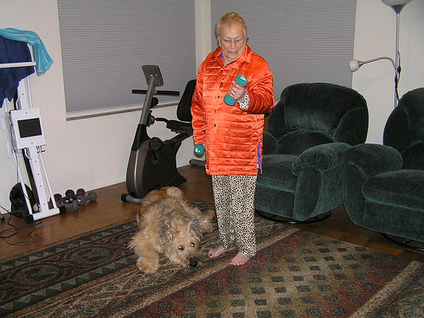It’s never too early to start
Two separate studies have come to conclusions to help aging Americans live longer and happier. New UCLA research suggests that the more muscle mass older Americans have, the less likely they are to die prematurely, while new Concordia University research reveals that the more confidence an older adult has, the longer they will live.
Previous research has found building muscle mass to be important in decreasing metabolic risk, but the data Dr. Preethi Srikanthan analyzed focused on a group of 3,659 individuals that included men who were 55 or older and women who were 65 or older at the time of the survey. The researchers looked at muscle mass index as it relates to the risk of death (of natural causes).
They found that all-cause mortality was significantly lower in the fourth quartile of muscle mass index compared with the first quartile.
“In other words, the greater your muscle mass, the lower your risk of death,” said Dr. Arun Karlamangla, an associate professor in the geriatrics division at the Geffen School. “Thus, rather than worrying about weight or body mass index, we should be trying to maximize and maintain muscle mass.”
Of course, we cannot definitively establish a cause-and-effect relationship between muscle mass and survival using a cohort study like this. “But we can say that muscle mass seems to be an important predictor of risk of death,” Srikanthan says. “We conclude that measurement of muscle mass relative to body height should be added to the toolbox of clinicians caring for older adults.”
Anyone who has trained with weights and gained muscle mass will you that it builds confidence and self-esteem, which makes the following research from Concordia University that much more powerful. Psychology researchers Sarah Liu and Carsten Wrosch found that if an individual’s self-esteem decreased, the stress hormone cortisol increased and vice versa. This association was particularly strong for participants who already had a history of stress or depression.
The research team met with 147 adults aged 60 and over to measure their cortisol levels, self-esteem, stress, and symptoms of depression every 24 months over four years. Results showed that maintaining or even improving self-esteem could help prevent health problems. “Because self-esteem is associated with psychological wellbeing and physical health, raising self-esteem would be an ideal way to help prevent health problems later in life,” says Liu.
While it’s easier said than done to tell an older adult to “go out and make more friends, or simply enhance their feelings of self-worth,” says Liu from a practical standpoint, such steps improve self-esteem and thereby health.

